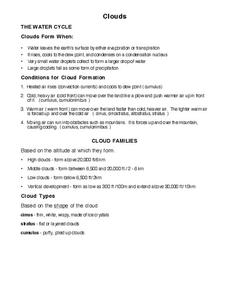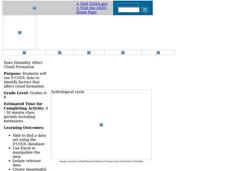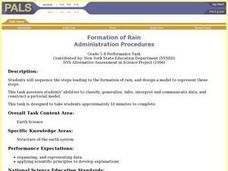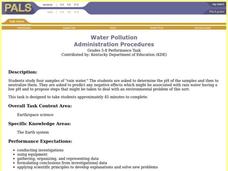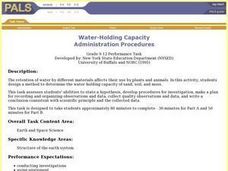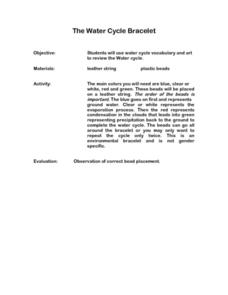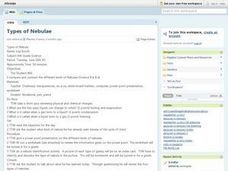Curated OER
The Water Cycle Dance
Second graders synthesize the four parts of the water cycle by participating in a water cycle dance. They perform movements that signify each stage of the cycle.
Alabama Learning Exchange
The Water Cycle
Students participate in a hands-on experience with the water cycle. They experience different parts of the water cycle through experiments and exploring the Internet. They create a poster or model of the water cycle and explain each part...
Curated OER
Water Cycle Drama
Young scholars explore the water cycle. In groups, students choose a card and then pantomime the picture depicted on the card. Other group members guess the name of the cycle being performed. As a class, young scholars share the numerous...
Curated OER
If I Were A Raindrop!
Students review the water cycle. In this water cycle lesson, students review the different stages of the water cycle. Students use the computer program Kid Pix Weather to help demonstrate understanding.
Curated OER
Three Clouds Activity
Students explore how clouds are produced through three different age-appropriate hands-on experiments.
Curated OER
How Do Clouds Form?
Students describe how they believe clouds form. They observe the different types of clouds they see and identify the types. They examine what affects the size and shape of clouds.
Curated OER
Dew Point
Fourth graders investigate saturation conditions and measure the dew point. They conduct an experiment, record data on a worksheet, and measure the dew point in the experiment.
Curated OER
Classification of Clouds
Students view progressive slides of cloud formations and identify which type of cloud is shown as it forms. They estimate the cloud's height while viewing each image.
Curated OER
Water 3: Melting and Freezing
Students understand that most substances may exist as solids, liquids, or gases depending on the temperature, pressure, and nature of that substance. This knowledge is critical to understanding that water in our world is constantly...
Curated OER
Clouds
In this science worksheet, students look for the meaning of the water cycle and its relation to the formation of clouds. They read the information about the different types of clouds.
Curated OER
Quiz: Weather Terminology #1
In this science worksheet, 3rd graders focus on the weather. Students respond to ten fill in the blank questions regarding specific terminology used in weather.
Curated OER
Water Cycle and Ecosystems
Students explore the water cycle. In this investigative lesson, students examine the water cycle process. They will record their observations and discuss marine and freshwater ecosystems.
Curated OER
Knowledge Quiz
In this oceans quiz worksheet, students complete a 10 question multiple choice quiz covering a variety of concepts related to the ocean.
Curated OER
As a Matter of Fact!
Pupils explore matter. They use a formula to measure the volume of matter.
Curated OER
Does Humidity Affect Cloud Formation?
Students use NASA's S'COOL database to identify factors that affect cloud formation.
Curated OER
Using Radiosonde Data From a Weather Balloon Launch
Student use radiosonde data from a weather balloon launch to distinguish the characteristics of the lower atmosphere. They learn the layers of the atmosphere. They graph real atmospheric data.
Curated OER
Measuring Water Vapor: The Microwave Water Radiometer (MWR)
Students investigate water vapor. They view and analyze photos, conduct Internet research, and analyze the total water vapor/total liquid water data plot.
Curated OER
Formation of Rain
Students sequence the steps leading to the formation of rain, and design a model to represent these steps. This task assesses students' abilities to classify, generalize, infer, interpret and communicate data, and construct a pictorial...
Curated OER
Water Pollution
Students study four samples of "rain water". They asked to determine the pH of the samples and then to neutralize them. Students are asked to predict any negative effects which might be associated with water having a low pH and to...
Curated OER
Water-Holding Capacity
Students design and conduct an experiment to compare the water-holding capacity of sand, soil, and moss. They measure the change in weight for each material after adding the same amount of water to each material.
Curated OER
Domestic Water Supply Case Study
Students follow the cycle of a raindrop from its source into the water supply for their houses and then back to the environment. They draw and, properly label and explain a diagram of a water treatment plant and a sewage treatment plant.
Curated OER
The Water Cycle Bracelet
Students participate in a creative project in order to investigate the water cycle. They create a bracelet with different colored beads that represent the concept and the order of its occurrence. Students are evaluated according to the...
Curated OER
Types Of Nebulae
Eighth graders explore the different types of nebulae that can be found in the solar system. They view a PowerPoint presentation about the material and identify each nebulae as it is presented. Students also discuss the life cycle of a...
Curated OER
Structure-Property Relationships
Students explore the structure and property changes of water through videos and classroom discussion. They are introduced to atomic arrangement of solids by looking closely at carbon in different forms, such as graphite and diamond....











